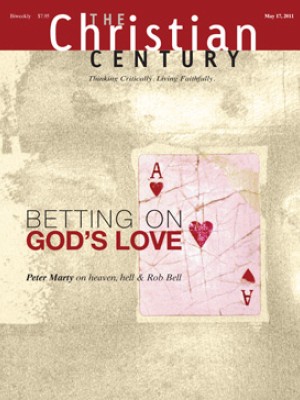Sunday, May 29, 2011: Acts 17:22–31; 1 Peter 3:13–22
Walk through most people's houses, and you'll quickly get a sense of what they love. The art on the walls, the books on the shelves, the kitchen gadgets, photographs, knickknacks and pets, the size and number of TVs—all reveal where the occupants' hearts lie.
A tour through most people's homes will also show you what they fear—especially if you're willing to poke around. Here are some of the fears my house would reveal. Locks on the doors and windows: invasion and theft. Fire extinguishers: destruction. Gate in the kitchen doorway: unsupervised interaction between giant dog and tiny son. Suction bulb syringes in every room: infant choking to death on his own vomit (the result of seeing a particularly graphic video at the hospital). Savings and retirement account statements: instability and poverty. Then there's—oh Lord—the medicine cabinet. Moisturizer: wrinkles. Sunscreen: skin cancer and wrinkles. Special shampoo: dandruff. Vitamins: wrinkles? Scurvy? You get the idea. Some of these items reflect prudence; others reflect more than a little silliness. All of them reveal fears.
Read our latest issue or browse back issues.
The same could be said of Paul's tour through Athens. In one sense, all the idols and temples point to what the people of the city love: their gods and the virtues, blessings and graces they represent. In another sense, they show what the people fear: those same gods and the anger that the people will call down upon themselves if they fail to worship them properly. Of all that Paul sees, one thing speaks more eloquently of fear than the others: the altar to an unknown god, the one that's erected just in case there's a god out there whom the people haven't yet heard of but who is powerful enough to make them sorry should they offend him or her. Ever the opportunist, Paul tries to win the people over to his God by exploiting both the Athenians' fear and their prodigious capacity for devotion.
"Do not fear what they fear," says the author of 1 Peter. Do not fear gods of stone and metal. Do not fear unknown gods. Do not fear humans who set themselves up as gods, dealing death and offering a pale imitation of life. Do not even fear death. Fear that in trying to preserve your bodies you might miss out on life. Fear that though the realm of God is all around you, you might miss it if you're not paying attention.
When they ask why you're smiling and what unknown God you know that they do not, have an answer ready. Be prepared to tell them what you have seen and what you have heard. Tell them what is worth fearing and what is not.
My favorite benediction comes from the New Century Hymnal: "May you love God so much that you love nothing else too much. May you fear God enough that you need fear nothing else at all." People always get the first half of that statement with no problem, at least in theory. But once in a while I'll hear from somebody who doesn't like the second half—the part about fearing God. "I believe in the God of love," she says, "the God Jesus showed us. I don't believe in a wrathful, punishing God, and I won't worship a God I'm scared of."
Fair enough. I'm not about to argue with those who say that they worship the God made known to them by the living Christ, but I do usually tell them this: there's fear and then there's fear. There is the kind of fear that most of us know is silly but share anyway: fear of what the neighbors think or fear of drooping skin. There is the kind of fear born of prudence or lived experience: violence from the people around us, losing the ones we love. Then there is the fear of God, which is more like awe. For me the difference is what I would be willing to drop to my knees for. It's hard to imagine bowing down to thieves or wrinkles. But what about the day when I find myself face to face with the Creator of heaven and earth? I imagine that then there will be nothing I can do but bow down, and that I will love doing it.
The challenge is to find ways to live bowed-down lives. Not lives forced into being bowed down or cowed into being bowed down. Not lives bowed down to gods made of gold or plastic, or to security locks or younger-looking skin. I'm speaking of lives bowed down under an easy yoke of devotion, a light burden of intimacy with a living God who created all and loves beyond any simple understanding, who invites us out of our lesser fears. Our task is to find ways to live so that when visitors come poking in the cabinets of our lives, they learn that while we may worry about our kids and hate dandruff, we know that the only thing really worth fearing is a life without God.



